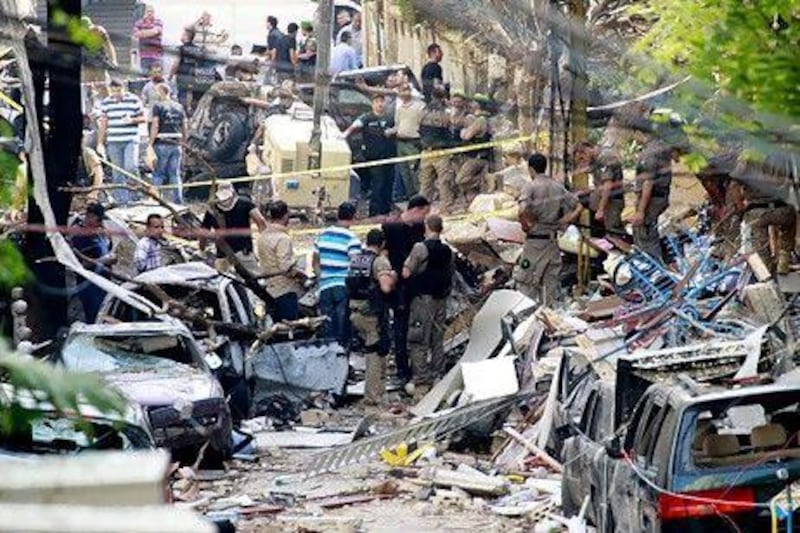One of the fundamental cornerstones of sovereign analysis is that if there is no political vision there is no economy.
This is why, even before Friday's bomb in the Beirut neighbourhood of Sassine, which took out one street, killed eight people and injured at least 50 others, Ernst & Young reminded us that Lebanon's already pitiful level of foreign investment was down 84 per cent for the first half of this year compared to the same period in 2011. The writing was on the wall before the wall collapsed.
Lebanon's various chambers of commerce may have taken the unusual step in calling for the resignation of the government for failing to provide "security and stability" but this looks unlikely. The truth of the matter is that Lebanon's economy is always going to struggle, even with a modicum of "security and stability".
A day after the Sassine outrage, I was sitting in a London restaurant with Nadim Shehadi, the former director of the Centre for Lebanese Policy Studies at Oxford and now a fellow at Chatham House, the London-based think tank. Whenever two or three Lebanese are gathered together anywhere in the world, they bemoan the plight of their nation. This lunch was no exception and I told Nadim that my family and I had decided to eventually leave Lebanon.
"Now you are a real Lebanese," he beamed. "But you will never actually 'leave'. You will simply base yourself outside Lebanon like we all do and go back every now and then and enjoy it. It's an ideal set up especially as Lebanon is not competitive enough to offer anything else".
Nadim went on to tell me of a conference he organised in London in the mid 1990s. "I gathered together all the leading Lebanese economists at the time, plus the village idiot I invite to every conference."
The "village idiot", it turned out, is actually far from being any kind of idiot, but a carefully chosen outsider brought in to ask the questions that may seem so obvious they would normally be overlooked. He is perceived by the assembled crowd as someone who knows nothing about the subject. In this case, the "village idiot" was the distinguished British economist Nigel Harris.
"After everyone had spoken, giving glowing, quixotic assessments of Lebanon's potential, I asked Harris to give his two cents' worth. He stood up and politely told us that, as far as he could tell, our manufacturing industry was a non-starter because land, labour and fuel were expensive. Ditto agriculture.
"As for tourism, we could never expect to develop into a serious destination because again we were expensive and did not have any sandy beaches and all the other mass tourist attractions. The Lebanese contingent came up to me and asked 'Who is this guy? What does he know?'"
Well, nearly two decades on, we have no real manufacturing industry to talk of and our agriculture sector is spearheaded by the microscopic eight million bottle wine industry, which generates revenues of a laughable US$40 million (Dh146.9m). It may be a great ambassador but it cannot carry a sector. Our already decimated tourism industry was never able to diversify and reach out to the package tourists from Basingstoke or Budapest, despite its rich potential in religious, heritage, ecological and medical tourism. We smugly said we didn't want them anyway, that we knew who our customers were and what they liked.
We took the path of least resistance by relying on Arabian Gulf money, as we have when it came to wooing foreign investment, mainly by convincing them to buy a pied-à-terre in Beirut's relatively liberal milieu. But Lebanon can't even count on the Gulf money anymore and last Friday's blast will make it even shyer. What's left is a weakened banking industry that relies on remittances and lending to the state and a property sector that has all but ground to a standstill.
The village idiot nailed it.
Michael Karam is a Beirut-based writer





